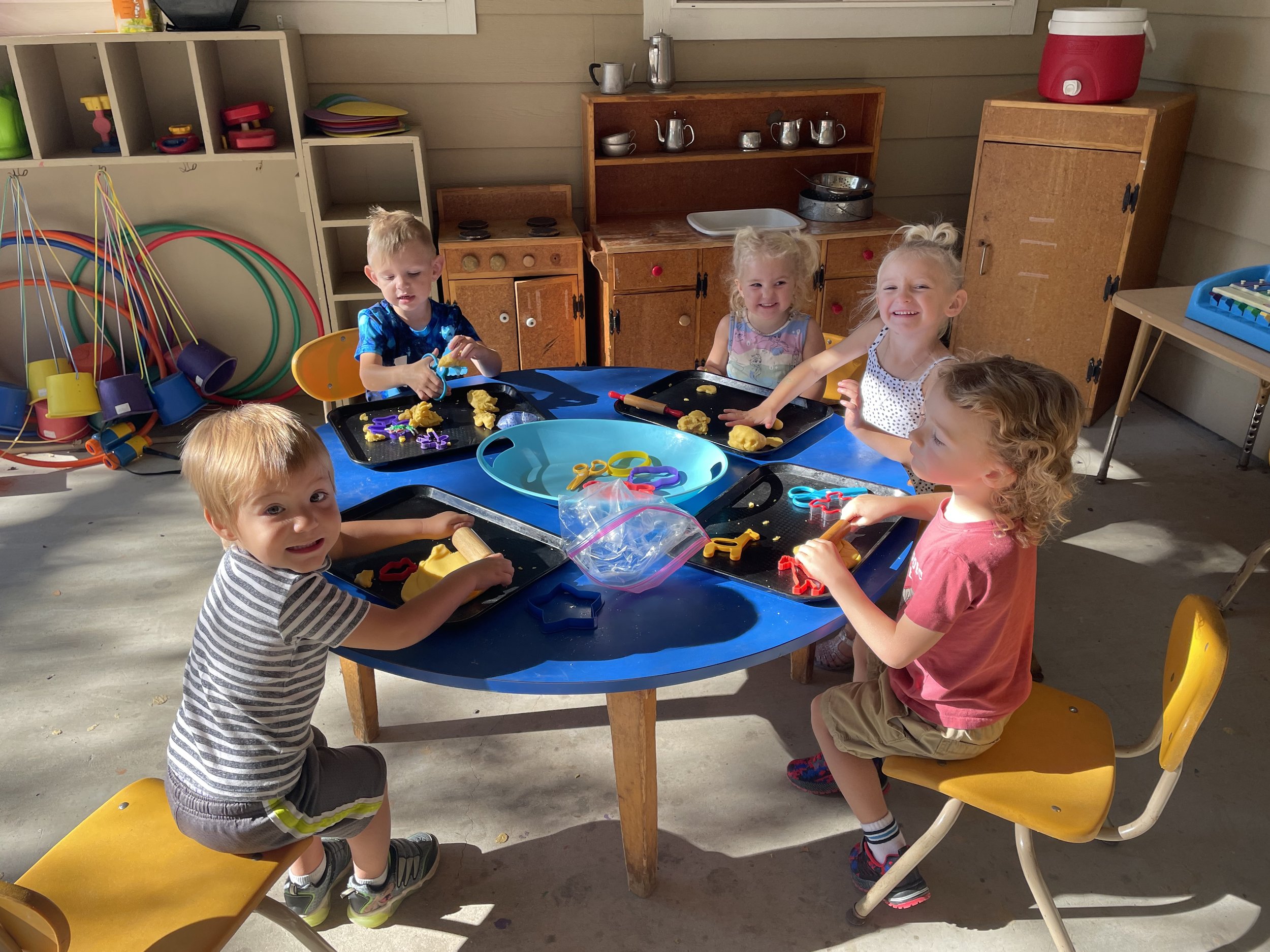
Redding Cooperative Preschool
About the Preschool
Since 1956, the Redding Cooperative Preschool has provided quality educational opportunities.
Celebrating 65+ years of parent participation and fun, the Redding Co-Op Preschool is a non-profit, non-sectarian, parent participation preschool featuring a variety of interactive experiences encompassing literature, science, physical education, arts, crafts, and music. The Redding Cooperative Preschool is licensed by the State of California. License # 455401222
The preschool is managed by the parents and operated by a teacher-director, who is a certified early childhood educator. Under the guidance of the teacher-director, parents take turns helping at the preschool by working an assigned day each week (every Wednesday, for example). Five “parent-teachers” are scheduled to work each day. The parent-to-child ratio is always at least one adult to four children (plus the director). In addition, parents are required to attend a monthly meeting, as well as serve on one of the committees that help to manage the preschool.
The Redding Co-Op Preschool enrolls up to a maximum of 20 children ages 2 years, 9 months to 5 years old.
Our
Philosophy
Preschool is a time of tremendous change and development in children. Children are learning how to make choices and develop relationships with others. Redding Cooperative Preschool provides choices in an enriching and supportive atmosphere, while encouraging children to build relationships with others. Parent education and involvement ensures a program that supports each individual child’s needs.
Learning Through Play
Play is an important vehicle for children’s social, emotional, and cognitive development, as well as a reflection of their development.
Understanding that children are active constructors of knowledge and that development and learning are the result of interactive processes, early childhood educators recognize that children’s play is a highly supportive context for these developing processes. Play gives children opportunities to understand the world, interact with others in social ways, express and control emotions, and develop their symbolic capabilities. Play provides a context for children to practice newly acquired skills and also to function on the edge of their developing capacities to take on new social roles, attempt novel or challenging tasks, and solve complex problems that they would not or could not otherwise do. Child-initiated, teacher-supported play is an essential component of developmentally appropriate practices in early childhood curriculums.
Excerpted from “Developmentally Appropriate Practices in Early Childhood Programs” National Association for the Education of Young Children, 1997 Sue Bredekamp and Carol Copple, Editors
Why Choose a Cooperative Preschool?
A cooperative preschool is owned, operated or both by a group of parents and staffed by professional teachers. Parents help the teachers in the classroom and may do some or all of the daily work necessary to operate a successful school.
The cooperative school recognizes that parents are the primary educators of their children. It encourages mothers and fathers to share their interests and talents in the classroom, on a Board of Directors, or on committees. These direct parental efforts and involvement make the cooperative a unique educational opportunity. The children grow in mind, body and spirit as they are nurtured with acceptance and kindness by teachers and other parents. Activities include art, music and movement, science, language arts, fine motor play, dramatic play and outdoor play as part of a planned curriculum the community of teachers and parents deem developmentally appropriate.
Parent education is stressed in co-op preschools so that both children and parents receive the best education possible. Communication with teachers and other parents, along with helping in the classroom and observing children as they play, learn, and grow, gives parents and children the best education possible.
Why Preschool Instead of TK?
Transitional Kindergarten (TK) has emerged in California as a bridge between preschool and kindergarten, and many parents have seen it as a replacement for preschool. We disagree!
Preschool — especially the cooperative model — is designed to develop your child’s social and emotional well-being before academic concerns rise to the front. While we certainly develop core skills, the most important part of the day is learning to get along with others. Ultimately, we believe that socially well-adjusted children perform better academically.
And while “transitional” kindgergarten promises to ease students into the full school setting, our program is actually a more gradual transition, easing the process for both children and parents. Our assisted model ensures that parents are involved for part of the time while also allowing time for independent development.
Finally, being able to develop our own curriculum and operate our own space means that our preschool is more tailored to the needs of preschool-aged children, including outdoor play and other sensory-rich activities. We strike a balance between necessary structure and creative exploration that kids love!


